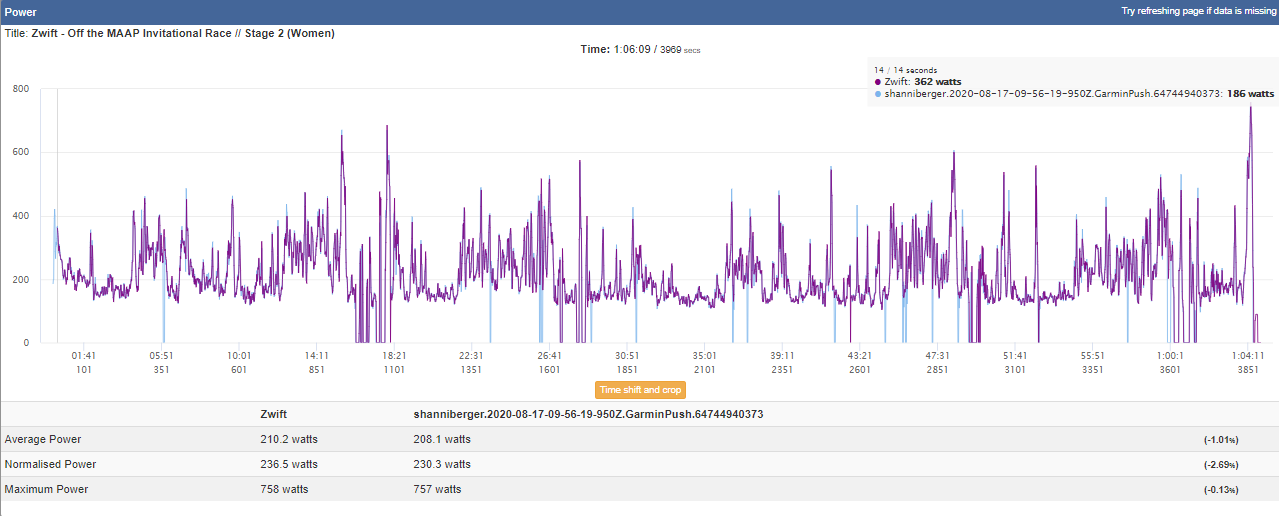‘I want to clear my name, it’s devastating’: Zwift racer speaks out after being banned for data manipulation
Shanni Berger, 19, denies editing her power files and says she doesn’t have the technological knowledge to prove her innocence


The latest race content, interviews, features, reviews and expert buying guides, direct to your inbox!
You are now subscribed
Your newsletter sign-up was successful
“The most important thing is that I want to clear my name,” said Shanni Berger, an Israeli racer who has been banned from Zwift racing for six months.
Berger, who is racing her first season at elite level, has been suspended from competing on the online platform after she was found guilty of data manipulation following an event earlier this year.
The 19-year-old has denied editing her power file, saying Zwift reached its decision before she was given due process and that she doesn’t have the technological knowledge to prove her innocence.
Speaking to Cycling Weekly from her home in Tel Aviv, the day before competing in the Israeli under-23 National Championships, Berger said: “I'm just 19, my career hasn't even started. And I feel like someone's trying to end it before it's even started.
“It's really devastating because I really have no knowledge to even explain what happened.”
The case dates back to August 17, 2020, when Berger competed in the Off the MAAP Women’s Race #2 virtual event on Zwift, finishing second.
The event required riders to use a smart turbo trainer as their primary source of power data, not a power meter.
The latest race content, interviews, features, reviews and expert buying guides, direct to your inbox!
Zwift data after the race suggested that Berger had instead used a power meter, and had also appeared to pair the same power meter with Zwift via Bluetooth and a secondary Garmin via ANT+ for “dual-recording” purposes.

This prompted the Zwift Performance Verification Board, which is responsible for investigating data to uncover possible cheating, to strip Berger of her result, but that decision was then protested by her team manager and team owner.
According to the board, Zwift’s software development team then investigated the files and found discrepancies in the power data, which suggested the files may have been modified after the event to look like the ride was recorded on a trainer, instead of a power meter.
According to the board, the two power files Berger submitted had a zero per cent discrepancy, which would be impossible if the power was recorded from two separate devices.

Berger has denied manipulating her files, saying that she has checked the two power files she submitted and that she discovered a 1.44 per cent discrepancy, which would be consistent with recording power from a turbo trainer and a power meter separately. The power data is available to view on Zwift Power.
She added: “The second accusation is that I manipulated the log file and it's just absurd. I am technology challenged, I can say that. I have neither the knowledge nor ability to hack 24,000 lines of the log file. It sounds like you have to be a hacker to do it. So, it's a little bit absurd. I have no explanation why the file on my computer is different in the file on the Zwift server, except the fact that it's a glitch.”
Berger added that her suggestion of trying to reproduce the glitch via video conference plus offering full real-time online access to her computer to Zwift’s engineers, was ignored.
She said: “I don’t have the technical know-how to explain what went wrong – but they do. Why wouldn’t they give me the chance to prove my innocence?”
The Zwift Performance Verification Board ruled “beyond any reasonable doubt that the rider used their power meter as the primary source of power for the race, and therefore that the original judgement of annulling the result of the race for breaching the Technical requirements of the event should stand.”
The ruling added: “The board further consider that it is beyond reasonable doubt that the log.txt file provided by the rider as evidence of the pairing they used was edited after the event to change the primary power source.
“The board consider that it is beyond reasonable doubt that this was a deliberate action to fabricate evidence to try to overturn the original decision by Zwift to annul the rider’s result in the race.”
Berger was banned for six months for “bringing the sport into disrepute” and “fabrication or modification of any data”.
The suspension was backdated to the day when the edited file was submitted to Zwift, running from August 18, 2020, to February 17, 2021.
She wasn’t the only rider to receive a ban from the Zwift Performance Verification Board in recent months, as London-based triathlete Lizi Duncombe was also suspended from pro-am racing for six months.
Berger's case was listed online as number 80, while Duncombe's was 10 number 109, prompting Berger to ask what happened to the other 107 cases.
Zwift said that the only cases listed online are those where a ban is currently being served, once the ban has ended the case is taken down.
Not all disqualifications result in a sanction, Zwift also said, for example faulty heart-rate monitors or no second power source would also be listed as cases, as the rider's result will have been annulled but they were not necessarily banned.
Duncombe previously told Cycling Weekly she denied deliberately editing her performance data and she was “shocked how the situation escalated.”
Berger says she has received abuse and hate since the verdict was made public, adding that it has seriously impacted her mental health.
On how Zwift investigates cheating, Berger said the company is doing a great job and that the measures in place before the race were very strict.
Berger said: “I don't know what can be done better because I think they're doing a great job.
“We did the weight videos and height videos, and we sent them files from the past on the road, not on the trainer so you cannot manipulate them.
"I sent them the calibration and the model of the trainer, the model of the power meter, with pictures and everything.
“I really don't think I could do more. So this is why I was so surprised that I was accused of such things because I think it’s just absurd.
“I felt like I did everything right.”
Berger's ban was published online by Zwift in September, while Duncombe's ruling was released in October, but they did not come to the attention of the public until they were picked up in the US by Cycling Tips last week.
A spokesperson for Zwift said: "Firstly it's important to note that these bans are unrelated and should be treated as separate cases. Both bans came into force from the date issued, and have not recently been issued or backdated.
"The evidence of data tampering in both cases was overwhelming and we do not feel the need to comment beyond the findings already published.
"We do not condone any ill behaviour directed towards Shanni, Lizi or any Zwift athlete and take matters of abuse seriously."
Berger added: “I'm just devastated, I'm depressed, I feel like I'm wrongly accused. I guess you can understand how it feels, I just don't know what to do. I don't understand computers so I cannot defend myself. I mean, it's me against Zwift. I don't want to say it but it's a little girl against the big company. I do not have the technological means nor the financial means to prove my innocence; Zwift is a rich company with both financial and technological resources. It's not a fair game.”
Alex Ballinger is editor of BikeBiz magazine, the leading publication for the UK cycle industry, and is the former digital news editor for CyclingWeekly.com. After gaining experience in local newsrooms, national newspapers and in digital journalism, Alex found his calling in cycling, first as a reporter, then as news editor responsible for Cycling Weekly's online news output, and now as the editor of BikeBiz. Since pro cycling first captured his heart during the 2010 Tour de France (specifically the Contador-Schleck battle) Alex covered three Tours de France, multiple editions of the Tour of Britain, and the World Championships, while both writing and video presenting for Cycling Weekly. He also specialises in fitness writing, often throwing himself into the deep end to help readers improve their own power numbers. Away from the desk, Alex can be found racing time trials, riding BMX and mountain bikes, or exploring off-road on his gravel bike. He’s also an avid gamer, and can usually be found buried in an eclectic selection of books.
